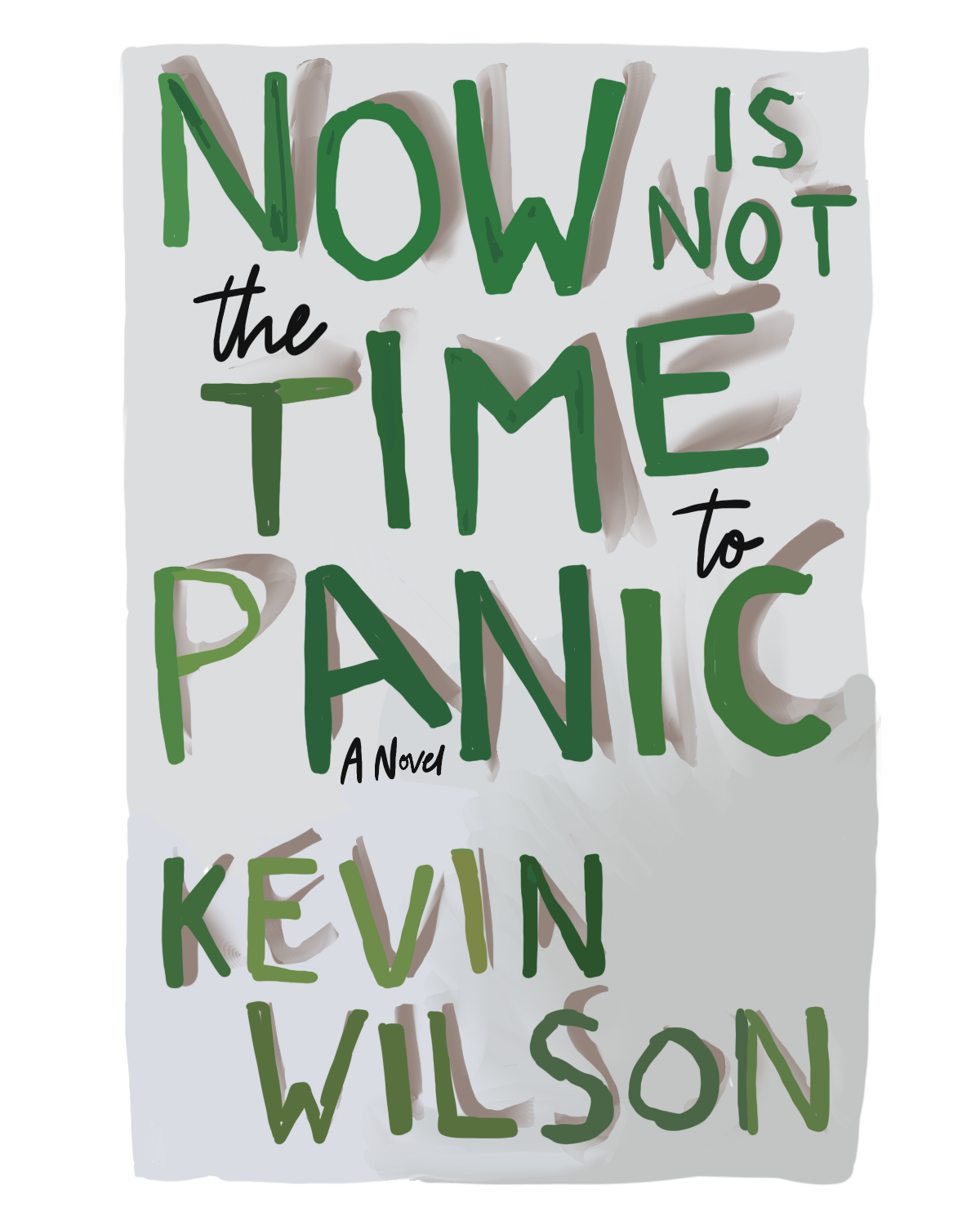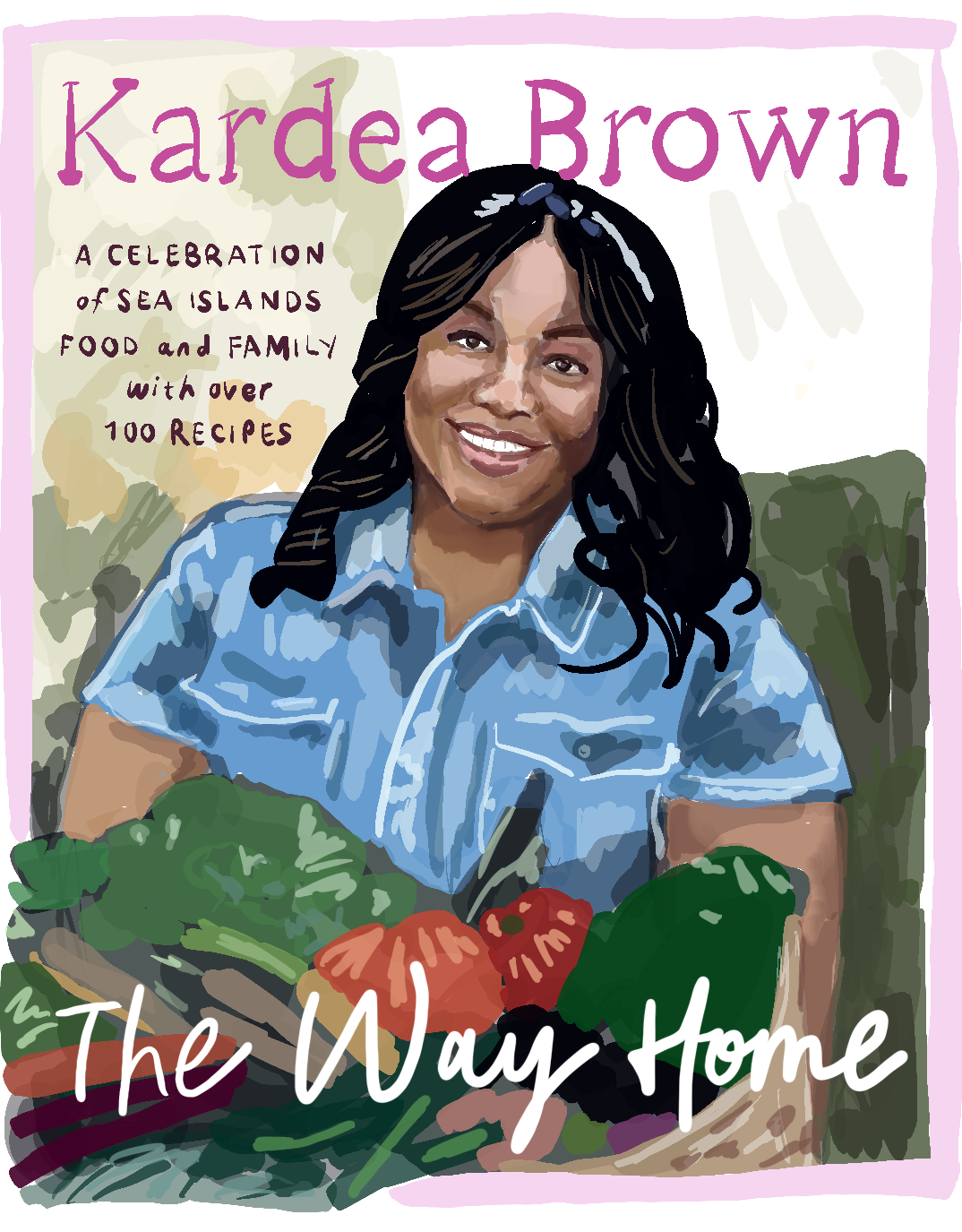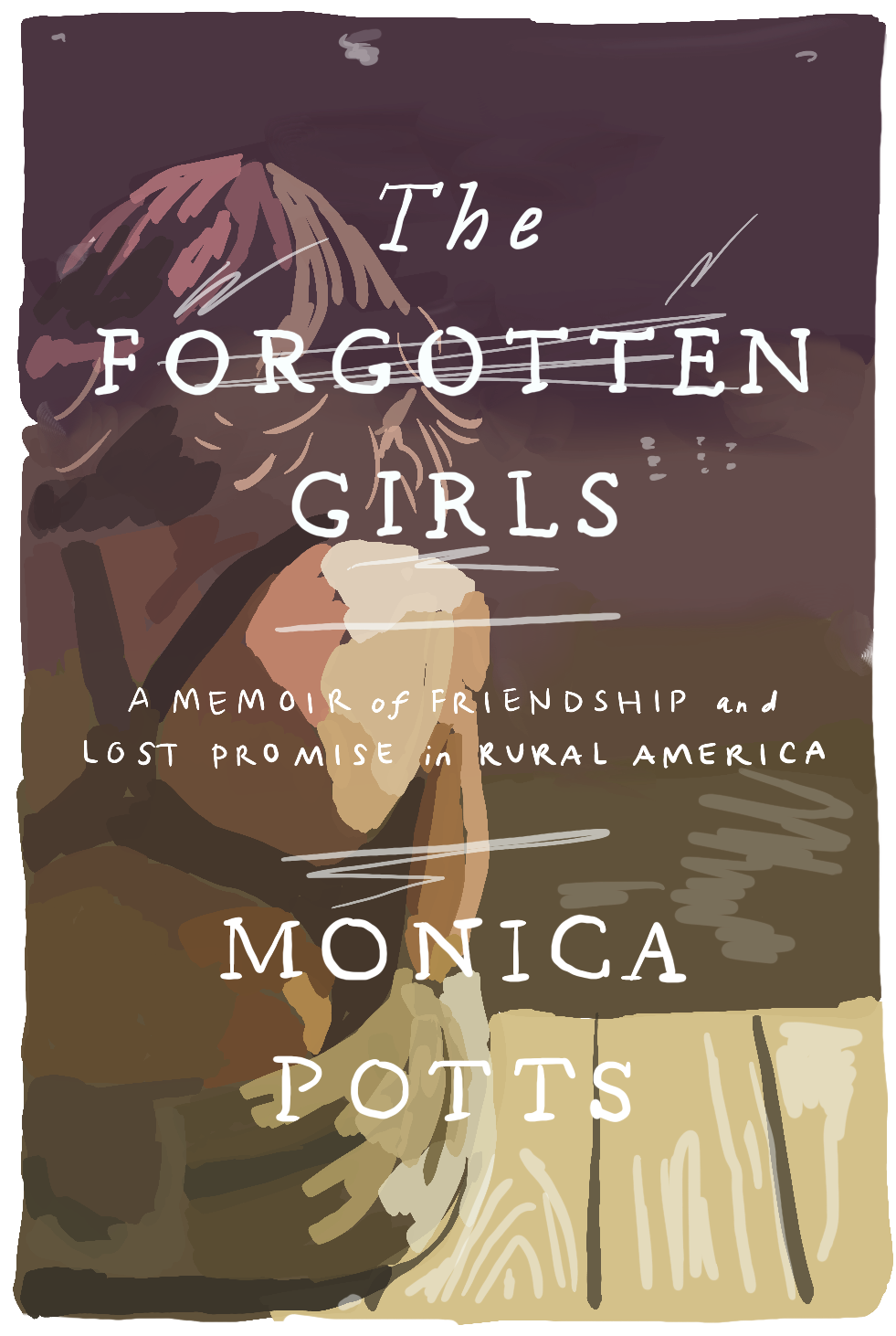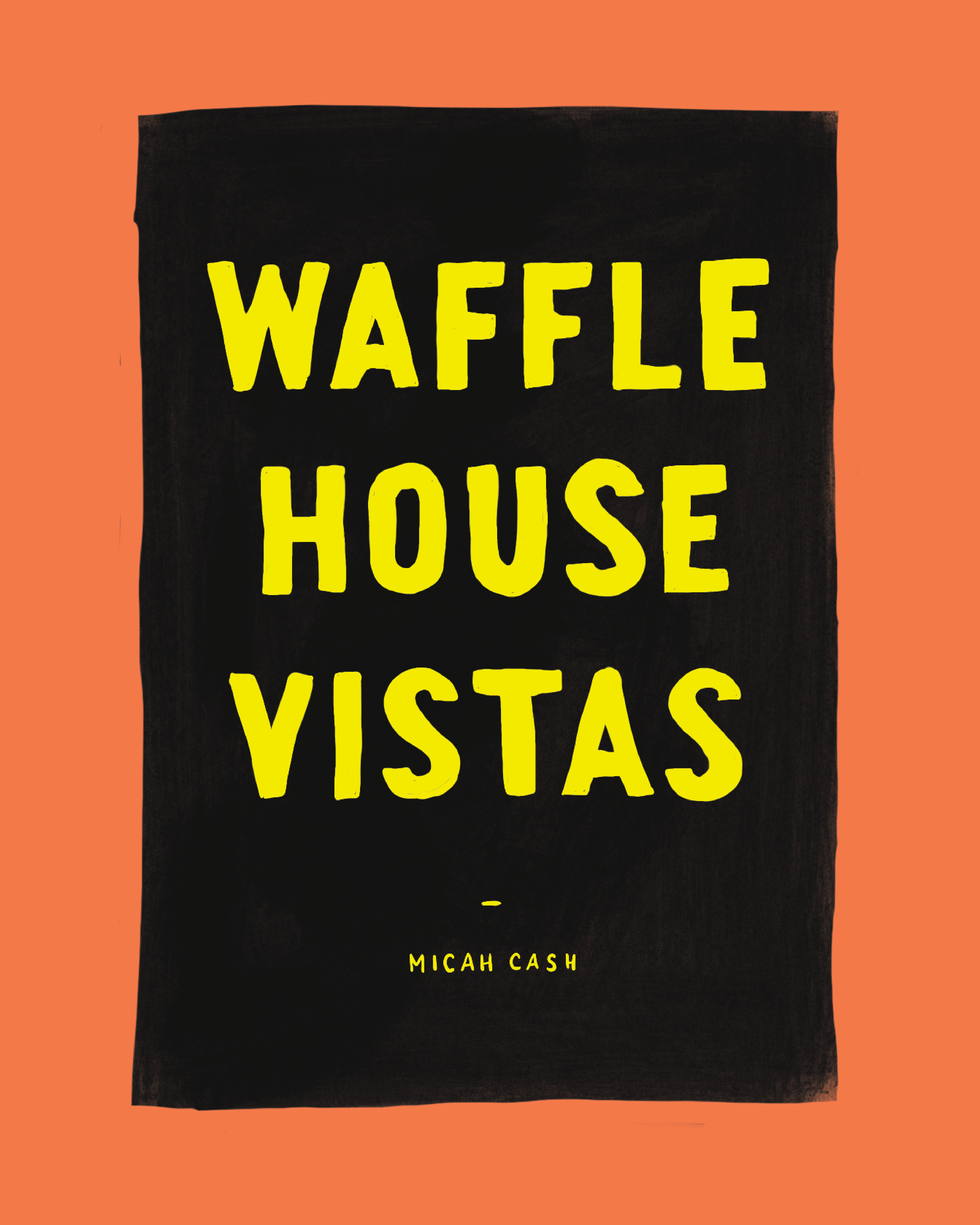Novels from seasoned and debut authors, cookbooks from Wadmalaw Island and Oxford, Mississippi, and more are all featured in The Bitter Southerner’s annual Summer Reading Roundup.
Words by Alison Law | Illustrations by Martha Park
May 23, 2023
Why do we read books?
Because our English teacher required us to over summer break, which meant we spent the first week of August sardining Steinbeck’s The Grapes of Wrath into our brains, all the while wondering if every Great American Novel plodded along like that turtle on the highway in an early chapter. It is a marker of how much we’ve learned when we reread Steinbeck’s words as an adult and marvel at the metaphors we couldn’t possibly have understood at 15.
Because books offer windows into worlds and people that are otherwise closed to us. I will never know what it’s like to be a young Black woman living in 1957 Alabama, hearing the first whispers of the Civil Rights Movement, like the main character, Alice, in Moonrise Over New Jessup. In What Things Cost, I gain more than 100 lyrical perspectives on the same urgent topic. And though I did not grow up preparing the same dishes found in books by Vishwesh Bhatt, Toya Boudy, Kardea Brown, and Michael Twitty, I can connect with the concept of finding home in certain ingredients and meals. We read to build empathy and embrace what we cannot know.
Because they entertain us. To paraphrase Audre Lorde, self-care is an act of resistance. And entertainment is self-care. Why else would we devote hours of nonrenewable time to flipping or swiping pages or letting a voice nestle audiobooks into our ears? The iconic Lucinda Williams knows the power of entertainment. She pursued the medium of memoir at a time when her health and circumstances prevented her from writing and performing songs.
Because books make us feel. This is perhaps the most threatening feature to those who want us not to read books. Books evoke emotion, and emotions inspire action. People who weaponize book bans, defund libraries, outlaw drag queen story hours, and criminalize teachers know that if they can disconnect us from our emotions, they can stop us from thinking and questioning. They can prevent us from relating to each other and seeing every person as a fellow flesh-and-blood human being. They can block us from better understanding ourselves. They can keep us from grieving, fuming, laughing, and experiencing the relentless hope and joy that books bring. They can silence us.
For 10 years, The Bitter Southerner has provided a platform for the artists and innovators who help us imagine a Better South. Not a monolithic region of sameness, but a multitude of flawed, terrible, incredible, tantalizing, and exciting stories. I love presenting this Summer Reading Roundup each year not because I want you to agree with my taste or like every book on the list, but because I want you to feel. I want you to read.
I Am From Here: Stories and Recipes From a Southern Chef
By Vishwesh Bhatt
Voted Best Chef: South in 2019 by the James Beard Foundation, Vishwesh Bhatt discovered the joy of cooking as a boy in his native India. He accompanied his father to the vegetable market in the walled city of Ahmedabad and portioned rice into pots in his mother’s kitchen. Bhatt and his family immigrated to the United States when he was 18. After filling in for his mother at a vegetarian restaurant in Oxford, Mississippi, Bhatt traded graduate studies for culinary school and has been the executive chef of Snackbar, a Southern brasserie in Oxford, since 2009. He writes in the book’s introduction, “I want people to see me as I see myself: an immigrant, a son of immigrants, who chose to make the South his home, and in doing so became a Southern chef.”
Decent People
By De'Shawn Charles Winslow
De’Shawn Charles Winslow returns to the setting of his award-winning novel In West Mills for this tale of small-town intrigue and murder. The story opens in 1976, as evidenced by the protagonist’s Plymouth Duster, olive green bathtub, and other ’70s pop culture references. Jo Wright’s family can’t understand why she, a Howard-educated Black woman in her 50s, would retire in the racially segregated town of West Mills, North Carolina. They don’t know that Jo, historically unlucky in love, has reconnected with her childhood sweetheart Olympus “Lymp” Seymore. Their plans to marry are interrupted when Lymp becomes the main suspect in the murders of his three half-siblings, who are found shot to death in their home. Jo must investigate far more than these murders to learn whether her fiancé is who he says he is.
Don’t Tell Anybody the Secrets I Told You
By Lucinda Williams
Lucinda Williams prefaces her memoir with a chronological list of the many places she’s lived since her birth in Lake Charles, Louisiana, in 1953. Williams’ father was a college professor who moved the family every two to three years to take new teaching jobs. The singer-songwriter and three-time Grammy winner suffered a stroke in 2020, and while she has made a remarkable recovery, she can no longer play guitar. Part of her rehabilitation was writing this memoir that matter-of-factly details her mother’s lifelong struggles with mental illness, misogyny in the music industry, and the stories that inspired some of her most beloved songs. Williams’ 16th album, Stories From a Rock n Roll Heart, comes out June 30.
House of Cotton
By Monica Brashears
Monica Brashears melds Grimm’s fairy tales with elements of Southern gothic in her debut novel, House of Cotton. Magnolia, the 19-year-old main character, has just buried her grandmother. She has less than $20 in her bank account, and the landlord hovers lasciviously at her door. A well-dressed stranger comes into the gas station where Magnolia works and offers her a modeling job. She later finds out that his company, Cotton and Eden Productions, is a funeral home. Magnolia retreats from traumatic situations by imagining herself as a bit player in fairy tales, which makes it hard to know if the ghosts who start showing up are real or make-believe. Brashears, who describes herself as an Affrilachian writer, set the book in Knoxville, Tennessee.
What Things Cost
Edited by Rebecca Gayle Howell, Ashley M. Jones, and Emily Jalloul
What Things Cost features a who’s-who of contemporary writers penning pieces on labor, the first major anthology of its kind in almost 100 years. Ocean Vuong, Silas House, Sonia Guiñansaca, Crystal Wilkinson, Jericho Brown, Annette Saunooke Clapsaddle, and many others contributed original pieces that sing of the unrewarded labor of the immigrant, the woman, industry, and land. Rebecca Gayle Howell, a professor of poetry and translation at the University of Arkansas and poetry editor for The Oxford American, and Ashley M. Jones, the first Black woman poet laureate of Alabama, say these stories warn of the dangers of dividing working people and reveal the hidden costs of labor in the United States. All proceeds from the book will be donated to the Poor People's Campaign, a coalition of the working poor founded in 1968 by the Rev. Martin Luther King Jr. and revived in 2018.
Cooking for the Culture: Recipes and Stories From the New Orleans Streets to the Table
By Toya Boudy
Toya Boudy stirs more than appetites in Cooking for the Culture. This “Best Home Cook” winner and multicultural tourism ambassador for New Orleans dedicates the book to other strivers. She says her purpose in telling deeply personal stories — of growing up with strong parents who worked multiple jobs to support their family, struggling with school, and becoming a mom at 16 — is to stoke others’ creativity and ambition. That combination served Boudy well as she found confidence in the kitchen and built an audience hungry for her Cajun and Creole cooking tips on YouTube, Food Network, TLC, and more. This cookbook features more than 100 full-color photographs of food and family. Recipes for cookies made with commodity-box peanut butter reflect Boudy’s humble beginnings, while extravagant and “expensive ass” dishes reflect her evolution.
Now Is Not the Time to Panic
By Kevin Wilson
Whether you like your misfit family stories served à la performance artists (The Family Fang), utopian experiment (Perfect Little World), or combustible twins (Nothing to See Here), Kevin Wilson always delivers. His latest novel begins with the comparatively normal matriarch Frances Eleanor Budge. The famous author, wife, and mom answers the phone one day and is confronted with her past. A journalist named Mazzy Brower wants to know if Frances was involved in an unsigned poster campaign that incited the Coalfield Panic of 1996. Wilson says the book was inspired by friendships one summer while he was in college and the “ways in which art is the door that lets us walk into a new life, one that never seemed possible.” Ginnifer Goodwin, known for her roles in “Big Love” and “Once Upon a Time,” narrates the audiobook opposite the author.
We Deserve Monuments
By Jas Hammonds
Those seeking a summer love story tinged with intergenerational drama and mystery will devour this debut young adult novel. Seventeen-year-old Avery thought she would rule her senior year with her two best friends in progressive Washington, D.C. Instead, her mother uproots the family to rural Georgia to care for her dying grandmother, Mama Letty. Avery has vague memories of a fight that had estranged her mother and Mama Letty years earlier, but she gradually discovers that the rift has far deeper fault lines. Avery is biracial and openly queer, an anomaly in the small town of Bardell, where monuments honor dead white supremacists and queer love is relegated to the dance floor of a hidden club called Renny’s. The American Library Association honored Jas Hammonds and We Deserve Monuments with the 2023 Coretta Scott King/John Steptoe New Talent Author Award.
Demon Copperhead
By Barbara Kingsolver
If you’ve never read Charles Dickens’ David Copperfield, the book that Barbara Kingsolver reimagines as Demon Copperhead, you might be tempted to read both books simultaneously. This would be unfortunate for our beloved Dickens, whose orphaned Copperfield seems a less interesting and far more unreliable narrator than Kingsolver’s contemporary leading character. Born to a teenage mom and dead dad, Demon inherited survival skills in the womb. He’s content to roam the holler with his best friend, Maggot, until his mom remarries a terrible man and backslides into addiction. Kingsolver, a Kentucky native who lives in the book’s setting of the southern Appalachians, is a master of character and voice and was awarded a Pulitzer Prize for this novel. Demon Copperhead surfaces a truth: that our society has yet to adequately solve the perils of poverty, foster care, and child labor that plagued David Copperfield in Victorian England.
Above Ground
By Clint Smith
The author of the No. 1 New York Times bestselling How the Word Is Passed returns this year with a book of poetry. Clint Smith, a New Orleans native, plumbs the complex emotions and challenges of being a parent in Above Ground. In one poem, he explains the phenomenon of seeing stars that lived over 2.5 million years ago while gazing at the night sky from Earth. He likens it to looking at his child and seeing in that moment the ancestors who are now stardust in his son’s eyes. Other poems touch on the precarious nature of conception and birth and the simultaneous joy and wear of being a father in an uncertain world. Smith has described poetry as “the act of paying attention” that allows him to wrestle with a question without his journalistic obligation to present an answer.
The Kingdom of Sand
By Andrew Holleran
Andrew Holleran’s iconic first novel, Dancer From the Dance, brought to life New York’s gay club and cruising scene in the 1970s, after the Stonewall riots and before the devastating entrance of HIV/AIDS. Subsequent books cemented his place in the canon of gay literature. With his first novel in 16 years, Holleran shows us the other side of the coming-of-age story. The narrator in The Kingdom of Sand is a gay man who returned home to Florida at the height of the AIDS epidemic to care for his aging parents. Now in his 60s and alone, he resents having to cruise the adult video store on Highway 301. Indeed, he’s annoyed by the human need to be seen, to feel affection, now that old age has rendered him invisible and unlovable. Dark humor veins the story like the many two-lane highways of the Florida landscape.
The Way Home: A Celebration of Sea Islands Food and Family
By Kardea Brown
Kardea Brown says it wasn’t until she went away to college that she began to truly appreciate growing up on Wadmalaw Island, a barrier island off Charleston. She and her family take pride in their Gullah Geechee heritage — a culture, language, and cuisine cultivated by enslaved West Africans along the Atlantic coast of South Carolina and Georgia. Brown, who hosts her own show, Food Network’s “Delicious Miss Brown,” calls her style of cooking “New Gullah.” She incorporates what she’s learned from other places into the cooking she learned from her mother and grandmother. Beautiful full-color photos make you want to pour a glass of Palmetto Punch or Ma’s Blueberry Mocktail (two beverages featured in The Way Home) and drink in the many stories being told at Brown’s dinner table.
The Passenger and Stella Maris
By Cormac McCarthy
Sixteen years had passed since the publication of Cormac McCarthy’s Pulitzer Prize-winning The Road. Then, in 2022, two new novels set in the U.S. South arrived in quick succession. The Passenger came out in October, and the related Stella Maris was released in December. Those familiar with Cormac McCarthy’s work will immediately fall into the cadence of his dialogue-heavy, punctuation-sparse prose. The Passenger begins in 1980, when a salvage diver named Western locates a sunken jet off Pass Christian, Mississippi. Several items are missing from the otherwise intact plane, including one of the passengers listed on the flight manifest. Chapters shuttle between Western’s point of view and that of Alicia, a troubled mathematician. Stella Maris goes back in time eight years to tell Alicia’s story, completely in dialogue.
Moonrise Over New Jessup
By Jamila Minnicks
Set in 1957, this historical novel follows Alice Young, who flees her hometown of Rensler, Alabama, to join her sister Rosie in Chicago. Early in her bus trip, Alice stumbles upon the all-Black community of New Jessup. She sobs when she discovers no separate entrance for people of color at the bus stop, for the only hues of the people she sees are deep mulberry, ebony, and sun-gold cinnamon, like her. She settles into life in this sanctuary, taking a job as a seamstress’ assistant and catching the eye of Raymond Campbell. But Raymond questions the planned community’s founding principle that Black social advancement is only possible through continued segregation, and his secret organizing activities threaten their new life together. Jamila Minnicks won the PEN/Bellwether Prize for Socially Engaged Fiction for this story based on her family’s history in Alabama and her research into the 1,200 all-Black communities that were founded between the late 18th and early 20th centuries in the U.S.
Short Film Starring My Beloved’s Red Bronco
By K. Iver
K. Iver, a nonbinary trans poet from Mississippi, confronts the death of their first love, Missy, in this collection of elegiac poetry. Missy died by suicide in 2007 after a young life filled with anguish over their identity. Iver’s first poem in the collection, “Nostalgia,” establishes the genesis of a love story between a child who was assigned “girl” at birth who grows up and falls for Missy, who confides to no one else that he is really a boy. Another composition, “Who Is This Grief For?”, recounts the terse ways in which an acupuncturist forces the poet to grieve. “Her needle tries to release / a decade-old phone call / stuck in the tight meat / between my index finger / and thumb.” Pulitzer Prize-winning poet Tyehimba Jess selected Short Film for the 2022 Ballard Spahr Prize for Poetry.
Koshersoul: The Faith and Food Journey of an African American Jew
By Michael W. Twitty
Michael Twitty, a food historian and The Bitter Southerner contributor, won two James Beard Awards for his 2017 book The Cooking Gene. His follow-up, Koshersoul, is the second book in a planned trilogy about the intersections of food and identity. In Koshersoul, Twitty examines his religious heritage; he identifies as Black, Jewish, Southern, and gay. In this Venn diagram, he finds shared themes of exile, discrimination, and people who retain their culture and sense of place through the food they prepare and eat. In the book, Twitty writes that his many travels and life experiences have taught him to view all human beings “as people you can be blood with, bond with, and potentially break bread with.” He includes recipes and menu suggestions at the end of the book.
Diary of a Misfit: A Memoir and a Mystery
By Casey Parks
It’s 2002, and college student Casey Parks is consoling her mother. She will take back what she said about being gay, date her co-worker Richard at Blockbuster Video, and her mom and everyone will cease worrying about her immortal soul. Much to Parks’ surprise, her grandmother interrupts the conversation and defends her granddaughter’s coming out. She later explains to Parks that she grew up across the street from a person who had been kidnapped as a girl and lived the rest of his life as a man named Roy. That revelation puts the author on a years-long search to find out who Roy really was. Along the way, she discovers new things about herself, her family, and the close-knit community of Delhi (pronounced Dell-HIGH), Louisiana. Parks has reported on race, gender, and family issues for The Oregonian, The Washington Post, and other publications.
This Isn’t Going to End Well: The True Story of a Man I Thought I Knew
By Daniel Wallace
William Nealy became the author’s hero when he was a teenager and Daniel Wallace was 12. William jumped from the roof of the boy’s home and successfully landed in the swimming pool below. He climbed out of the pool, threw back a can of beer, then repeated the process. Wallace’s love for William only grew as the gifted kayaker, outdoorsman, and cartoonist married and cared for his sister Holly over the next 30 years. These anecdotes make it hard to comprehend the painful truth that Wallace shares in the book’s title and introduction: William died by suicide when he was 48 years old. Heartbroken and angry, Wallace spent years hating his brother-in-law. In this memoir, the bestselling author of Big Fish pieces together the life and death of his hero, one story at a time.
The Wishing Pool and Other Stories
By Tananarive Due
Tananarive Due further cements her status as a leading innovator in Black horror and Afrofuturism with her first new book in seven years. She began writing haunting stories and screenplays more than 20 years ago, long before Jordan Peele wrote and directed popular horror movies like “Get Out” and “Us.” Due writes in the introduction that her first novel, 1995’s The Between, was an act of faith that the Black horror genre would find an audience. Fans of the genre will appreciate the lead story, “The Wishing Pool.” A Black woman returns to her family’s cabin in the woods in Florida to check on the welfare of her father, who suffers from dementia. Due wrote the story during COVID-19, when she could not be with her elderly father.
The Forgotten Girls: A Memoir of Friendship and Lost Promise in Rural America
By Monica Potts
Journalist Monica Potts began investigating why white women who did not finish high school were dying five years younger than women of the previous generation. Her reporting on this alarming trend led back to her rural Arkansas hometown and childhood best friend, Darci. She and Darci both grew up in working-class families, excelled in the Gifted and Talented program, and plotted their escape to bigger cities like Fresno or Tucson on a world atlas. But their stories diverged greatly in high school. In The Forgotten Girls, Potts presents data explaining the phenomenon of people — mostly white, less educated, poor women living in rural America — dying young. She intersperses this with interviews with Darci and others in their community and learns new things about their different lives in the pages of high school journal entries. The author narrates the audiobook. This absorbing memoir comes out May 30.
Alison Law is a writer and communications professional living in Atlanta. An unapologetic book pusher and author enabler, she has interviewed more than 100 writers in Zoom rooms and recording studios and before live audiences at venues such as the Jimmy Carter Presidential Library, the Atlanta History Center, and the Margaret Mitchell House. She hosted the “Literary Atlanta” podcast from 2017 to 2019 and served in programming and media relations roles for the Decatur Book Festival.
Martha Park is a writer and illustrator from Memphis, Tennessee. She is a 2022-2023 Fellow with the Religion & Environment Story Project and a recipient of the William Graves Sackett Fellowship from the Virginia Center for the Creative Arts. Her work has appeared in Oxford American, The Guardian, Guernica, Granta, Ecotone, ProPublica, and elsewhere.




























